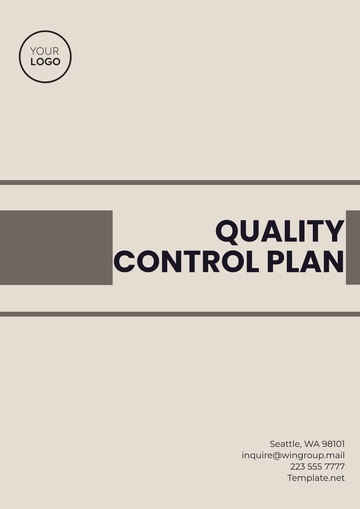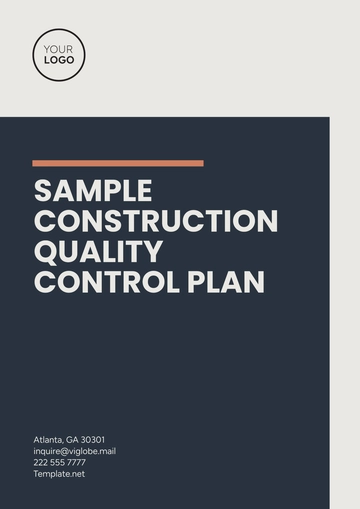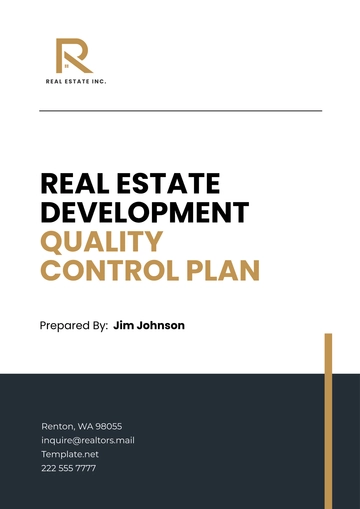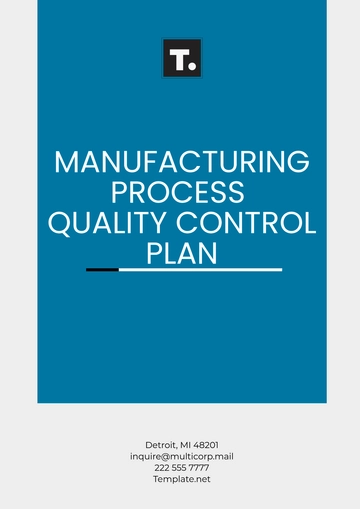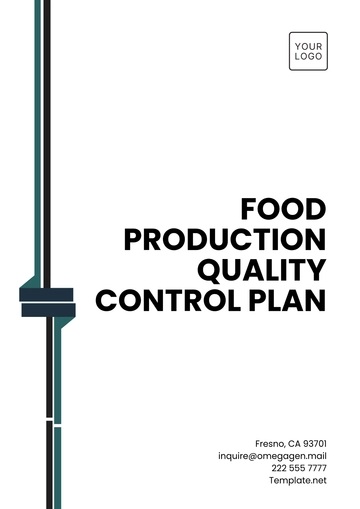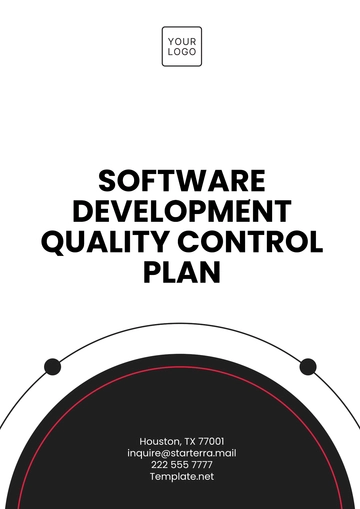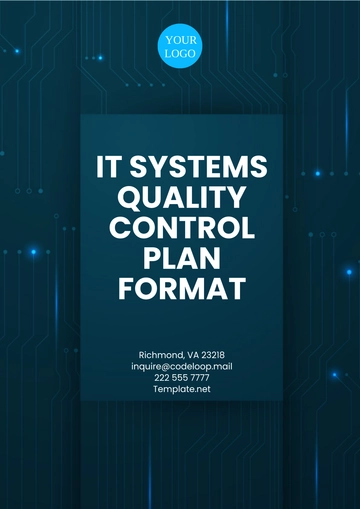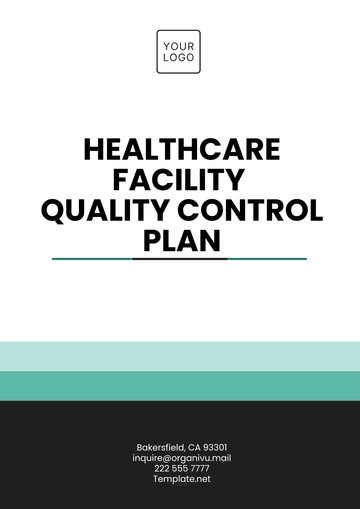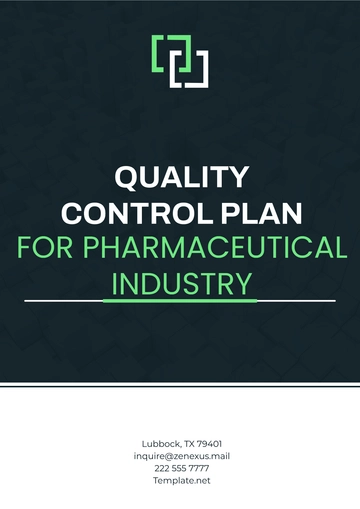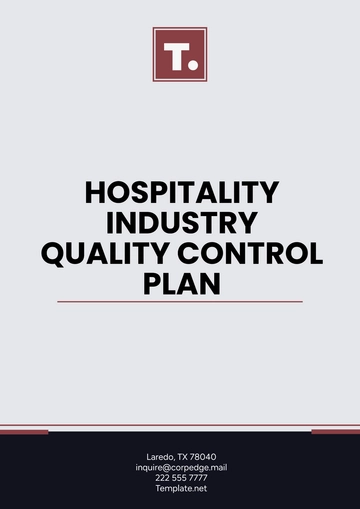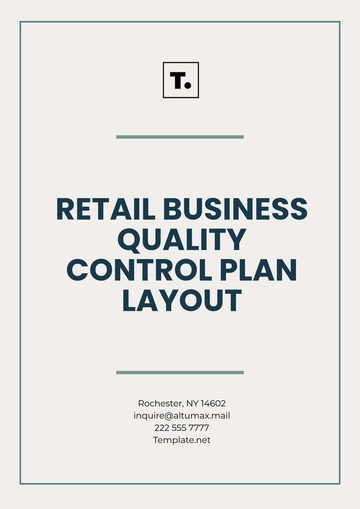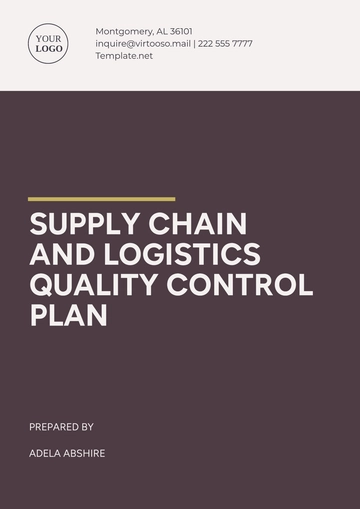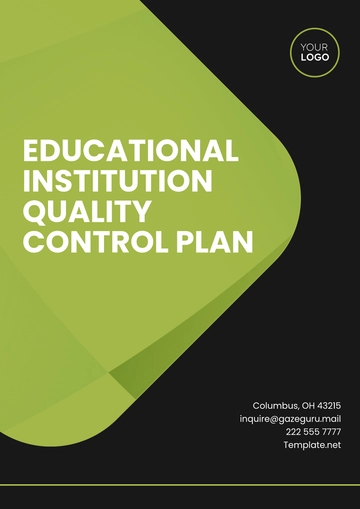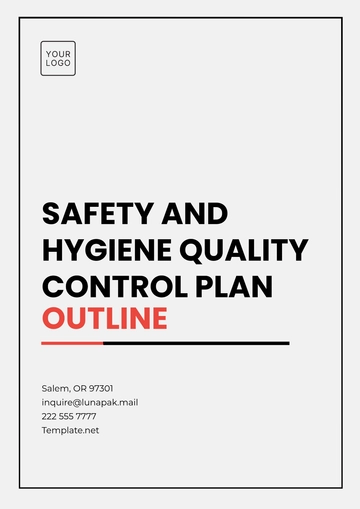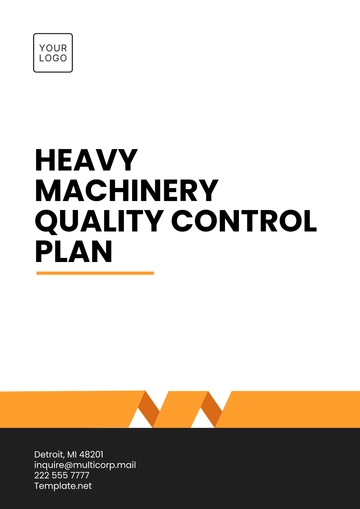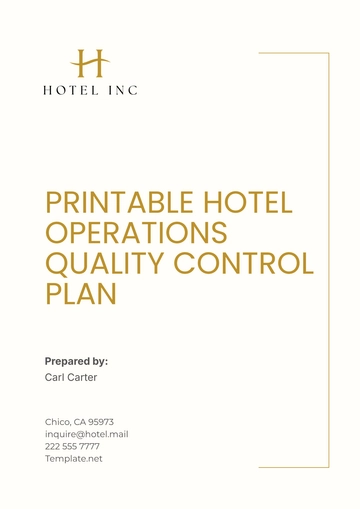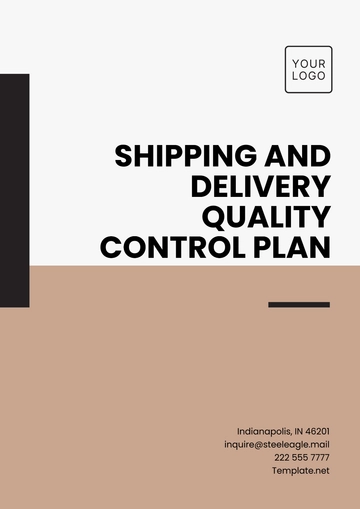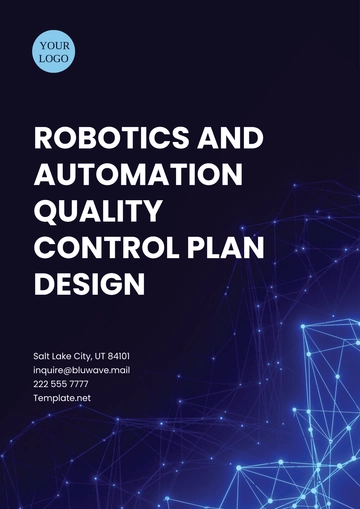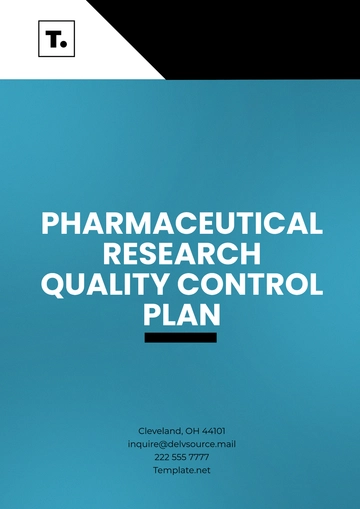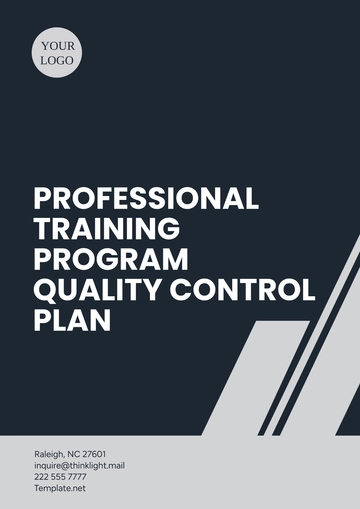Free Real Estate Development Quality Control Plan
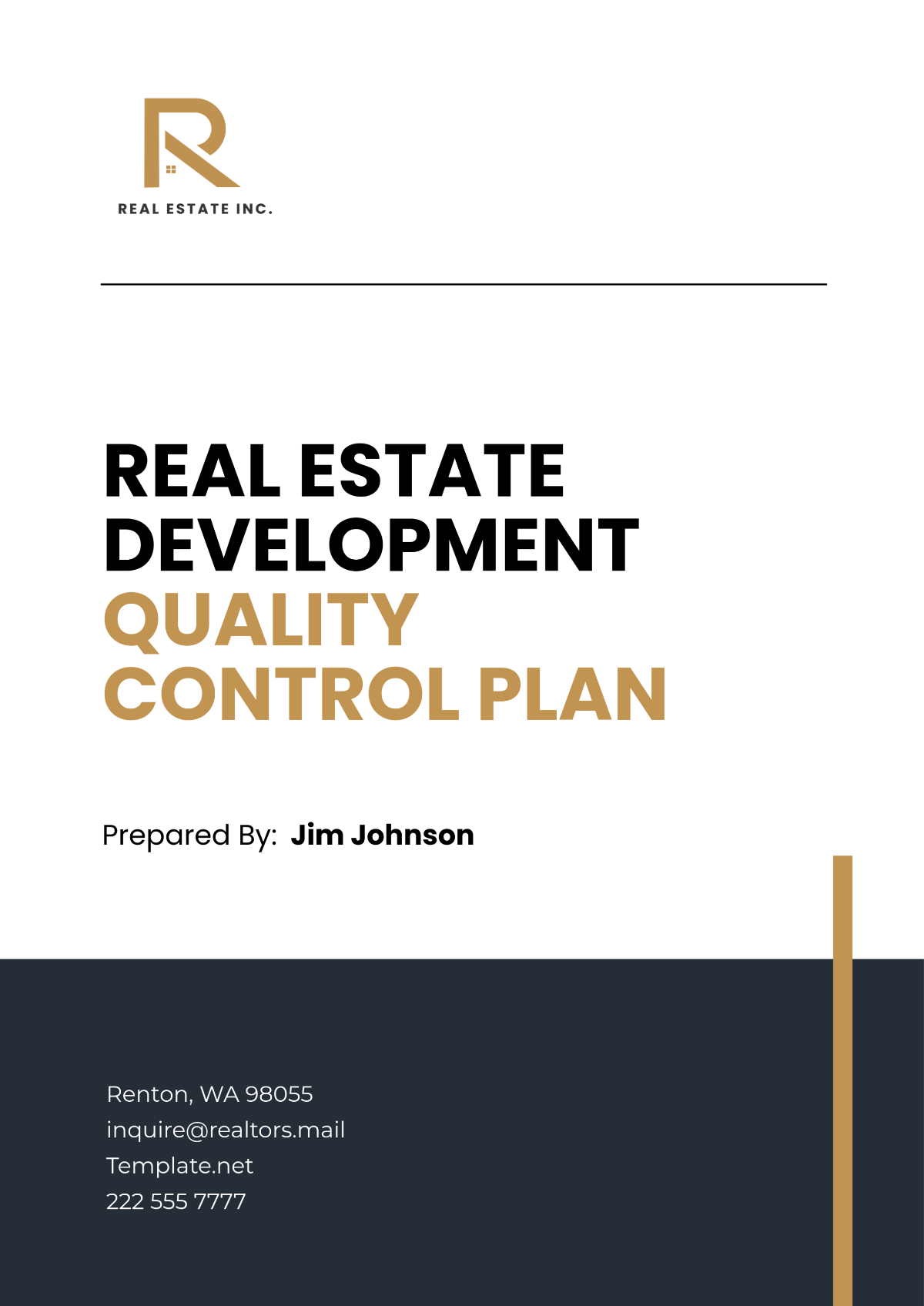
Prepared by:
[Your Name]
[Your Company Name]
1. Introduction
This Quality Control Plan (QCP) is designed to ensure that all real estate development projects adhere to the highest quality standards. Our primary goals are to maintain project integrity, enhance customer satisfaction, and ensure regulatory compliance. Our commitment to excellence underscores our reputation and success in the real estate industry.
2. Quality Objectives
The key objectives of this Quality Control Plan are to:
Adhere to project specifications and requirements
Ensure consistency in project deliverables
Minimize defects and rework
Continuously improve construction processes
3. Roles and Responsibilities
The success of our quality control process depends on the active participation and responsibility of each team member involved in the project.
3.1 Project Manager
The Project Manager is responsible for overseeing the entire quality process, ensuring that standards are met, and facilitating communication between different teams.
3.2 Quality Control Inspector
The Quality Control Inspector is responsible for monitoring construction activities, inspecting materials, and ensuring compliance with quality standards and regulations.
3.3 Site Supervisor
The Site Supervisor is tasked with daily onsite management, ensuring that the construction work aligns with the quality benchmarks and addressing any immediate issues that arise.
3.4 Design and Engineering Team
This team ensures that all project plans, drawings, and specifications meet the quality standards before construction begins.
3.5 Contractors and Subcontractors
All contractors and subcontractors are responsible for adhering to the quality standards outlined in this plan, ensuring that their work meets the required specifications.
4. Quality Control Procedures
To ensure the highest quality in our construction projects, the following procedures will be implemented:
4.1 Pre-construction Phase
Review project specifications and plans: Conduct thorough assessments of all project documents to ensure clarity and completeness.
Conduct materials evaluation and approval: Evaluate and approve all materials to ensure they meet quality and project requirements.
Develop quality metrics and benchmarks: Establish clear quality metrics and benchmarks to measure project performance.
4.2 Construction Phase
Conduct regular site inspections: Perform routine inspections to monitor progress and adherence to quality standards.
Monitor contractor performance against quality standards: Continuously evaluate contractor work to ensure compliance with quality criteria.
Document and report any discrepancies or defects: Maintain detailed records of any issues, ensuring they are promptly addressed.
Implement corrective actions: Develop and implement corrective action plans for any identified issues to prevent recurrence.
4.3 Post-construction Phase
Perform final inspections and approvals: Conduct thorough final inspections to ensure all work meets quality standards.
Ensure proper documentation of work and quality checks: Maintain comprehensive records of all work and quality assessments.
Conduct client satisfaction surveys: Gather feedback from clients to ensure satisfaction and identify areas for improvement.
Review project outcomes: Conduct a detailed review of the project outcomes to identify lessons learned and best practices for future projects.
5. Quality Assurance and Compliance
We will implement robust strategies to ensure compliance with industry standards and regulations, providing assurance that quality benchmarks are achieved and maintained. Regular audits and reviews will be conducted to uphold these standards.
6. Continuous Improvement
To enhance overall project quality, we will establish regular review and feedback mechanisms to identify areas for improvement. Implementing necessary changes based on these insights will drive continuous improvement in our construction processes.
6.1 Training and Development
Regular training programs will be conducted to keep all team members updated on the latest quality control practices and industry standards.
6.2 Performance Evaluation
Regular performance evaluations will be conducted to assess the effectiveness of the quality control processes and identify areas for improvement.
7. Conclusion
The Real Estate Development Quality Control Plan is vital for ensuring high standards, regulatory adherence, client satisfaction, and the overall success of our projects. It requires unwavering commitment from all stakeholders to continuously maintain and improve the quality of our construction processes.
- 100% Customizable, free editor
- Access 1 Million+ Templates, photo’s & graphics
- Download or share as a template
- Click and replace photos, graphics, text, backgrounds
- Resize, crop, AI write & more
- Access advanced editor
The Real Estate Development Quality Control Plan Template from Template.net is a fully editable and customizable tool designed to streamline your project management. Tailor every detail to your specific needs with ease. Editable in our AI Editor Tool, this template ensures a professional, efficient, and personalized quality control plan for your real estate development projects.
You may also like
- Finance Plan
- Construction Plan
- Sales Plan
- Development Plan
- Career Plan
- Budget Plan
- HR Plan
- Education Plan
- Transition Plan
- Work Plan
- Training Plan
- Communication Plan
- Operation Plan
- Health And Safety Plan
- Strategy Plan
- Professional Development Plan
- Advertising Plan
- Risk Management Plan
- Restaurant Plan
- School Plan
- Nursing Home Patient Care Plan
- Nursing Care Plan
- Plan Event
- Startup Plan
- Social Media Plan
- Staffing Plan
- Annual Plan
- Content Plan
- Payment Plan
- Implementation Plan
- Hotel Plan
- Workout Plan
- Accounting Plan
- Campaign Plan
- Essay Plan
- 30 60 90 Day Plan
- Research Plan
- Recruitment Plan
- 90 Day Plan
- Quarterly Plan
- Emergency Plan
- 5 Year Plan
- Gym Plan
- Personal Plan
- IT and Software Plan
- Treatment Plan
- Real Estate Plan
- Law Firm Plan
- Healthcare Plan
- Improvement Plan
- Media Plan
- 5 Year Business Plan
- Learning Plan
- Marketing Campaign Plan
- Travel Agency Plan
- Cleaning Services Plan
- Interior Design Plan
- Performance Plan
- PR Plan
- Birth Plan
- Life Plan
- SEO Plan
- Disaster Recovery Plan
- Continuity Plan
- Launch Plan
- Legal Plan
- Behavior Plan
- Performance Improvement Plan
- Salon Plan
- Security Plan
- Security Management Plan
- Employee Development Plan
- Quality Plan
- Service Improvement Plan
- Growth Plan
- Incident Response Plan
- Basketball Plan
- Emergency Action Plan
- Product Launch Plan
- Spa Plan
- Employee Training Plan
- Data Analysis Plan
- Employee Action Plan
- Territory Plan
- Audit Plan
- Classroom Plan
- Activity Plan
- Parenting Plan
- Care Plan
- Project Execution Plan
- Exercise Plan
- Internship Plan
- Software Development Plan
- Continuous Improvement Plan
- Leave Plan
- 90 Day Sales Plan
- Advertising Agency Plan
- Employee Transition Plan
- Smart Action Plan
- Workplace Safety Plan
- Behavior Change Plan
- Contingency Plan
- Continuity of Operations Plan
- Health Plan
- Quality Control Plan
- Self Plan
- Sports Development Plan
- Change Management Plan
- Ecommerce Plan
- Personal Financial Plan
- Process Improvement Plan
- 30-60-90 Day Sales Plan
- Crisis Management Plan
- Engagement Plan
- Execution Plan
- Pandemic Plan
- Quality Assurance Plan
- Service Continuity Plan
- Agile Project Plan
- Fundraising Plan
- Job Transition Plan
- Asset Maintenance Plan
- Maintenance Plan
- Software Test Plan
- Staff Training and Development Plan
- 3 Year Plan
- Brand Activation Plan
- Release Plan
- Resource Plan
- Risk Mitigation Plan
- Teacher Plan
- 30 60 90 Day Plan for New Manager
- Food Safety Plan
- Food Truck Plan
- Hiring Plan
- Quality Management Plan
- Wellness Plan
- Behavior Intervention Plan
- Bonus Plan
- Investment Plan
- Maternity Leave Plan
- Pandemic Response Plan
- Succession Planning
- Coaching Plan
- Configuration Management Plan
- Remote Work Plan
- Self Care Plan
- Teaching Plan
- 100-Day Plan
- HACCP Plan
- Student Plan
- Sustainability Plan
- 30 60 90 Day Plan for Interview
- Access Plan
- Site Specific Safety Plan
